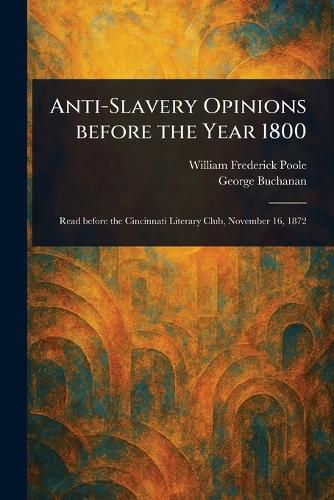Readings Newsletter
Become a Readings Member to make your shopping experience even easier.
Sign in or sign up for free!
You’re not far away from qualifying for FREE standard shipping within Australia
You’ve qualified for FREE standard shipping within Australia
The cart is loading…






This title is printed to order. This book may have been self-published. If so, we cannot guarantee the quality of the content. In the main most books will have gone through the editing process however some may not. We therefore suggest that you be aware of this before ordering this book. If in doubt check either the author or publisher’s details as we are unable to accept any returns unless they are faulty. Please contact us if you have any questions.
Explore the historical landscape of abolitionist thought with "Anti-Slavery Opinions before the Year 1800," a meticulously researched work by William Frederick Poole and George Buchanan. Originally read before the Cincinnati Literary Club in 1872, this text delves into the burgeoning antislavery movements within the United States during the formative years of the nation.
This work provides valuable insight into the intellectual and moral climate surrounding slavery in the 19th century, offering a comprehensive examination of early arguments against the institution. As the United States edged closer to the Civil War, understanding the roots of abolitionist sentiment became ever more crucial. This exploration of opinions before 1800 sheds light on the complex history of slavery in the United States, making it an essential resource for anyone interested in American history, the Civil War period, and the broader social science of slavery. A powerful look at a nation grappling with its conscience.
This work has been selected by scholars as being culturally important, and is part of the knowledge base of civilization as we know it.
This work is in the public domain in the United States of America, and possibly other nations. Within the United States, you may freely copy and distribute this work, as no entity (individual or corporate) has a copyright on the body of the work.
Scholars believe, and we concur, that this work is important enough to be preserved, reproduced, and made generally available to the public. We appreciate your support of the preservation process, and thank you for being an important part of keeping this knowledge alive and relevant.
$9.00 standard shipping within Australia
FREE standard shipping within Australia for orders over $100.00
Express & International shipping calculated at checkout
This title is printed to order. This book may have been self-published. If so, we cannot guarantee the quality of the content. In the main most books will have gone through the editing process however some may not. We therefore suggest that you be aware of this before ordering this book. If in doubt check either the author or publisher’s details as we are unable to accept any returns unless they are faulty. Please contact us if you have any questions.
Explore the historical landscape of abolitionist thought with "Anti-Slavery Opinions before the Year 1800," a meticulously researched work by William Frederick Poole and George Buchanan. Originally read before the Cincinnati Literary Club in 1872, this text delves into the burgeoning antislavery movements within the United States during the formative years of the nation.
This work provides valuable insight into the intellectual and moral climate surrounding slavery in the 19th century, offering a comprehensive examination of early arguments against the institution. As the United States edged closer to the Civil War, understanding the roots of abolitionist sentiment became ever more crucial. This exploration of opinions before 1800 sheds light on the complex history of slavery in the United States, making it an essential resource for anyone interested in American history, the Civil War period, and the broader social science of slavery. A powerful look at a nation grappling with its conscience.
This work has been selected by scholars as being culturally important, and is part of the knowledge base of civilization as we know it.
This work is in the public domain in the United States of America, and possibly other nations. Within the United States, you may freely copy and distribute this work, as no entity (individual or corporate) has a copyright on the body of the work.
Scholars believe, and we concur, that this work is important enough to be preserved, reproduced, and made generally available to the public. We appreciate your support of the preservation process, and thank you for being an important part of keeping this knowledge alive and relevant.